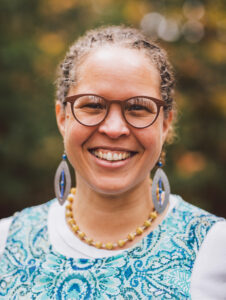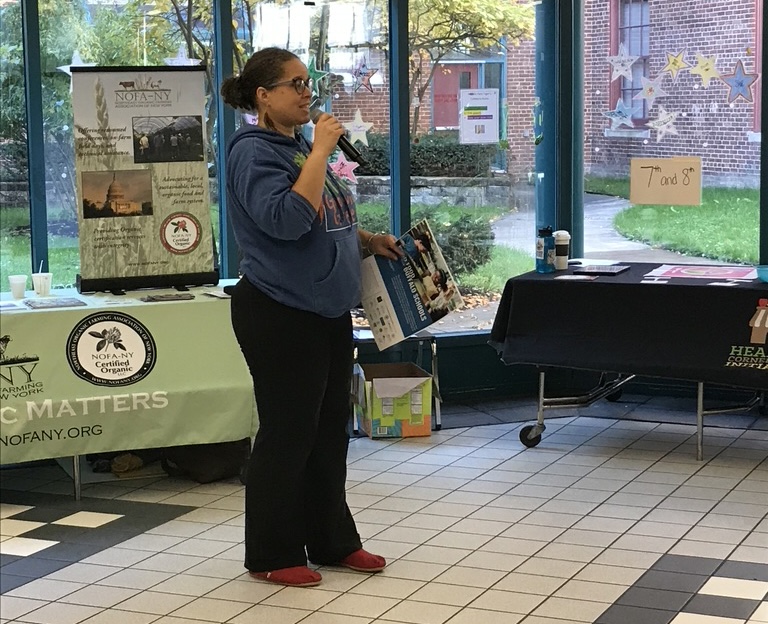Rebekah Williams is an organizer and trainer from Western New York and co-founder of Food for the Spirit, the Buffalo Food Equity Network, and the Good Food Buffalo Coalition. Jessica Gilbert-Overland is the Campaign Director of the Good Food Buffalo Coalition. In this feature interview for the CUNY Urban Food Policy Monitor, the Institute Managing Director Craig Willingham and the Institute Director of Policy, Rositsa T. Ilieva, ask Williams and Gilbert-Overland about the commendable work of the Good Food Buffalo Coalition (GFBC) to advance racial equity and improve institutional food procurement in tandem.
What is the background and mission of the Good Food Buffalo Coalition?
Jessica Gilbert-Overland (JG): The Good Food Buffalo Coalition (GFBC) was founded in 2018 and comprises over 20 member organizations. Our mission is “to bring the Good Food Purchasing Program (GFPP) to public institutions in the Western New York region and to assist those institutions to adopt and implement this Program in ways that align with our Coalition’s vision, roles, and beliefs, as well as with the five values of GFPP (local economies, animal welfare, nutrition, valued workforce, and environmental sustainability). Our efforts are grounded in the Good Food Buffalo Coalition’s commitment to fostering racial justice and transparency in the Western New York food system, and we advocate for the GFPP as a tool to reach these goals.
How did the Coalition develop and what were some of the precursors of this work?
Rebekah Williams (RW): The GFBC developed out of an interest to connect the work of the Buffalo Public Schools (BPS) Farm to School effort with climate justice principles including valued workforce, racial and environmental justice, and community engagement. Local organizers, aware of national GFPP efforts, invited speakers from the Food Chain Workers Alliance to present to BPS Food Service staff, procurement professionals, and Buffalo-based organizations. Those presentations took place in Buffalo in 2017, and they were the precursor to the launch of the coalition a year later. Parallel to the development of the GFBC was the development of Food for the Spirit, a movement-building food systems organization, based in Western New York and the Finger Lakes. I am the Co-Founding Director of Food for the Spirit.
Food for the Spirit (F4tS) is a member-organization of the GFBC and we are also the convener of the Buffalo Food Equity Network (BFEN), a grassroots effort of over 200 BIPOC members committed to a new food economy in Buffalo, led by and for communities of color. BFEN members include parents and caregivers affiliated with BPS, farmers and urban gardeners, and other food system actors of color. BFEN members have played a critical role in the development of the GFBC, and as a member of the GFBC, we have worked closely with the coalition around food system education and procurement issues.
Tell us about the evolution of your institutional food procurement efforts regarding racial justice.
JG: The Good Food Buffalo Coalition has always emphasized racial justice. From the outset, we hosted events that highlighted the important role of Black farmers in our food system and the potential for values-based procurement to support the health and well-being of Buffalo students. Such events included Harvest Festivals and a “Racial Equity in the Food System Timeline Training.” The Coalition formalized this commitment in 2019 when our members unanimously voted to adopt our mission, vision, and beliefs, which codified racial justice as a core Coalition value (http://bit.ly/gfbc_at-a-glance). Today, the Good Food Buffalo Coalition focuses our efforts on supporting farmers and food-related business owners of color who are interested in accessing institutional markets. This includes participating in statewide networks dedicated to supporting farmers and growers of color to access needed resources, advocating for the Good Food NY Bill, and partnering with local food justice organizations to advance the goals and priorities of those most impacted by racial injustice in food systems.
How have the efforts evolved, and what have been some of the most challenging and rewarding aspects of the process so far?
RW: Our racial justice work grew and evolved through thought-partnerships with other coalition leaders in Chicago, Minneapolis, and New York City. Leaders in both GFBC and the BFEN have participated in foundational activities with coalition leaders from those cities. First, the GFBC brought Zoe Hollomon to Buffalo in January 2019 to lead the “Racial Equity in the Food Systems Timeline Training”. Zoe Hollomon was the Coalition Coordinator for the Twin Cities GFPP Coalition. Many BFEN members participated in that training. Second, GFBC leaders and BFEN members traveled to Chicago IL twice. The first Chicago trip took place in the fall of 2018 and included several days of tours and meetings to learn from the Chicago Food Policy Action Council, who lead and maintain the GFPP efforts in Chicago and Cook County, Illinois. The second Chicago trip took place in spring of 2019 for the Power of Procurement Summit (https://powerofprocurement.org/).
During both trips to Chicago, BFEN members uplifted the concern that GFPP alone will not address issues of racial injustice in our local food system. In particular, they called out emergency food needs, and food supply chain and infrastructure gaps necessary to support Black farmers and food actors, and local communities. For BFEN members and BIPOC food actors in Buffalo, GFPP in itself is not a silver bullet solution.
How was that evolution informed by practice and research?
JG: We launched the Good Food Buffalo Coalition in 2018 with the release of a report that I wrote, “Good Food Purchasing for the Buffalo Public Schools,” which explores the potential for Buffalo Public Schools to pass and implement the GFPP. I then built upon this initial research through my doctoral work, which examined how the GFPP might – or might not – be able to foster racial justice in the Western New York food system. Ultimately, I concluded that the GFPP could be used as a tool to foster racial justice in our food system, if implemented intentionally and in line with the priorities of those most impacted. I also worked with many Black farmers to understand the barriers that they experience in general and in accessing institutional markets, explicitly. My research centered the voices, goals, values, and questions of the Coalition and Black farmers to ensure that my findings would be useful to our efforts. As a result, this Coalition-based research regularly informs our local and statewide advocacy approaches and has guided our policy work related to the Good Food NY Bill. This interplay between practice and research has been critical to the Good Food Buffalo Coalition’s ongoing evolution and to how we approach centering racial justice in our work.
You say that your coalition is grounded in “just process,” what does “just process” mean to you and what does “just process” look like for your coalition?
RW: Just process is a decision-making process that is inclusive of all coalition members and engages all members in the process. In 2020, the GFBC developed and implemented an inclusive decision-making process to determine which most impacted communities (MICs) our coalition would engage with and focus our efforts around. We used that process and agreed to focus our efforts on ensuring the coalition’s activities serve Black farmers in NYS. The kind of inclusive decision-making processes that the GFBC employs has been important for F4tS and BFEN members participating because our organization values self-determination and we center the “nothing about us, without us” sentiment, (which came out of disability-rights activism in the 1990s).
JG: The Good Food Buffalo Coalition continues to center “just process” in our efforts to pass and implement the GFPP in Western New York. From December 2021 – February 2022, the Coalition undertook a Policy Training to explore what it might look like to pass and implement the GFPP at various public institutions in the region. This process included research to understand potential impacts of the GFPP at the school district, city, county, and state levels, a roundtable with local and national partners to understand the opportunities and limitations related to leveraging the GFPP to foster racial justice, and a campaign strategy workshop with HEAL Food Alliance. Following this process, the Coalition collectively reaffirmed its commitment to passing and implementing the GFPP at Buffalo Public Schools as one way to advance racial justice in our regional food system.
In June 2022, the Coalition voted in a new Leadership Council, which expanded the Good Food Buffalo Coalition’s leadership team from four to eight people. We are now a BIPOC-led organization in that half of the Leadership Council identifies as BIPOC. Bringing on the Leadership Council has been another critical step to center “just process” in the Coalition’s efforts: it ensures that those most impacted by racial injustice in the Western New York food system are leading the Coalition and an expanded leadership team advances the long-term sustainability of the Coalition.
How has “just process” strengthened the Good Food Buffalo Coalition’s work to advance racial justice in the food system?
RW: The GFBC’s inclusive decision-making process allows its grassroots membership to direct campaign strategy and partnerships. Since BFEN members have also been deeply involved with state and regional Black-led farm and food system efforts such as Black Farmers United NYS and Black Farmer Fund, we have played a critical role in uplifting the needs of those constituencies within the coalition.
In 2020, through its inclusive decision-making process, the GFBC agreed to focus our efforts on serving Black farmers. Since then F4tS has connected GFBC and BFEN leaders in developing relationships with Black farmers and Black-led food systems organizations in NYS. As a result we are called on to uplift issues of concern to Black farmers and Black-led food systems organizations, thereby making us more effective in serving the needs of those folx, and as such, the GFBC is aware that supporting racial justice through BPS food procurement is not as simple as just getting more Black farmers to sell to the district; we know there are many more needs for Black farmers to have equitable access to public school markets.
Can you share what are some of the next steps for this work?
RW: In March of 2023, BFEN members partnered on the Buffalo Farm to School initiative’s Celebrating Cultural Diversity through Buffalo Farm to School grant, to host a Farm to School Workshop specifically for Black adults interested in supporting positive youth development through food and farm systems education in Buffalo schools. Our all Black-identifying team of BFEN members encouraged celebration of Black culture, food, and local farms, and we shared opportunities for workshop attendees to get involved in local food and farm system efforts. Following that workshop, BFEN members are excited to have a framework and agenda for future workshops, and we hope to encourage the BPS Farm to School effort to become more accessible and inclusive of parents, families, and food service staff.
In addition to our partnership with the BPS, BFEN members holding leadership positions with the GFBC and serving on GFBC committees and working groups are looking forward to upcoming action planning efforts for GFPP in Buffalo and WNY. Our intent is to support broad community representation and participation in those planning efforts.
JG: The Good Food Buffalo Coalition will continue to center “just process” as we build towards passing and implementing the GFPP at Buffalo Public Schools. Specifically, the Good Food Buffalo Coalition is preparing to launch a community-driven GFPP action planning process, through which the Coalition will engage communities most impacted by school food and racial injustice in our food system. Through conversations with those currently impacted by BPS food procurement (e.g., students, families, teachers, school food service staff), those interested in selling to BPS (e.g., farmers and business owners of color, farmworkers, food processors, and distributors), and BPS officials (e.g., the BPS Board of Education and the Food Service Department), we will identify overlapping goals and priorities for passing and implementing GFPP policy at Buffalo Public Schools. Highlighting the priorities of those most impacted by racial injustice in the Western New York food system, this action planning process will guide the Good Food Buffalo Coalition’s GFPP efforts moving forward.
In support of passing and implementing the GFPP at Buffalo Public Schools, the Good Food Buffalo Coalition will also continue its statewide efforts to pass the Good Food NY Bill. Because current New York State procurement law restricts public institutions from implementing values-based procurement practices, such as the GFPP, passing the Good Food NY Bill is an essential step towards achieving the Coalition’s goals in Western New York. Simultaneously working to pass the Good Food NY Bill and undertaking the community-driven GFPP action planning process, the Good Food Buffalo Coalition creates the foundation needed to pass and implement the GFPP at Buffalo Public Schools in a racially just manner.
What are some opportunities to stay informed about and support the Good Food Buffalo Coalition’s ongoing and upcoming initiatives?
JG: There are many ways to get involved with the Good Food Buffalo Coalition’s work and we would love to hear from you – or even collaborate! Some upcoming opportunities include:
- Join the Good Food Buffalo Coalition: For organizations in Western New York (defined broadly) interested in becoming a member of the Coalition, or for individuals looking to partner with us.
- Join the NYS GFPP Coalition: For individuals or organizations looking to get more involved in GFPP work generally and/or interested in the Good Food NY Bill.
- Ask NYS legislators to support the Good Food NY Bill: Please call your local and state representatives and ask them to support – and even co-sponsor! – the Good Food NY Bill. We have resources to help you do so, including talking points, a bill summary, and draft email and phone call scripts.
- Sign up for or support the NYS BIPOC Growers Resource Directory: For those identifying as a BIPOC grower or farmer and interested in receiving this resource directory, or for those part of an organization with resources for BIPOC growers and farmers that you would like to share.
- Support our work: We are actively seeking financial support to advance the Good Food Buffalo Coalition’s community-driven GFPP action planning process. Thank you to those interested in supporting our efforts to foster racial justice in the Western New York food system through passing and implementing the GFPP!
For more information about any of the above opportunities to get more involved, please contact me: Jessica Gilbert-Overland, jessica@goodfoodbuffalo.org. We look forward to hearing from you!
To learn more about Food for the Spirit and the Buffalo Food Equity Network, visit the website at www.foodforthespirit.org or contact them at info@foodforthespirit.org.
About the Interviewees

Rebekah Williams is an organizer and trainer from Western New York and co-founder of Food for the Spirit, the Buffalo Food Equity Network, and the Good Food Buffalo Coalition. In 2017, Rebekah began actively seeking support of local and national partners to bring the Good Food Purchasing Program to Buffalo. In 2018, she helped launch the coalition in Buffalo, and she transitioned into the part-time role of Coalition Coordinator. Rebekah served as Coalition Coordinator for the Good Food Buffalo Coalition until 2021 when she transitioned into serving as the Coalition’s Projects Committee Chair. At the coalition’s annual meeting this May, Rebekah stepped down as Projects Committee Chair and was re-elected to serve as the Coalition’s Outreach Committee Chair. As Outreach Committee Chair, Rebekah is most excited about uplifting the coalition’s values around community engagement, education, and centering people who are most impacted by food system’s injustices.

Jessica L. Gilbert-Overland is the Campaign Director of the Good Food Buffalo Coalition. She supported the founding of the coalition in 2018 and previously served as the coalition’s Policy Committee Chair. In addition to her work with the Good Food Buffalo Coalition, Jessica is a food justice scholar. Her research examines the strategies employed by social movements to foster racial justice and to advance a just transition in and beyond food systems. Much of her research focuses on the Good Food Buffalo Coalition, its efforts to pass Good Food Purchasing Policy in WNY public institutions, and how values-based public institutional food procurement might (not) support NY Black farmers. She received her PhD from the University at Buffalo in 2021.
